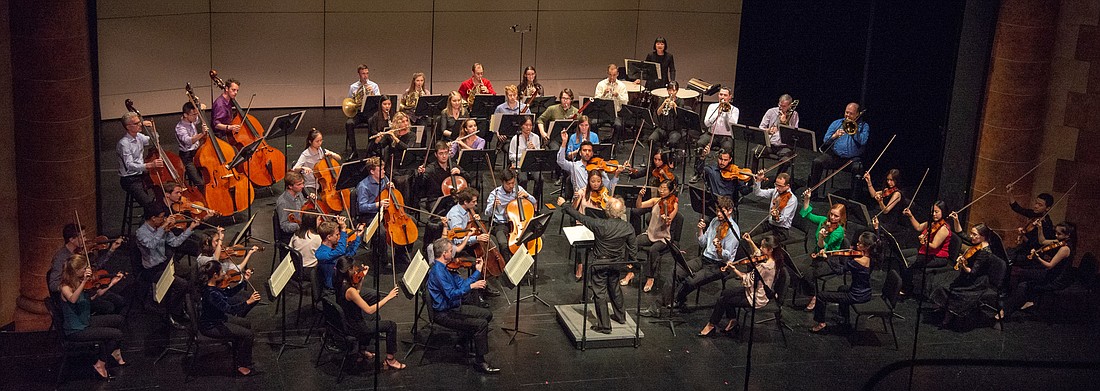- December 20, 2025
-
-
Loading

Loading

The 55th Sarasota Music Festival came to a rousing finale June 22 with the sold-out Sarasota Opera House audience standing and cheering during “Pianos Paired.” The ovation was well deserved with outstanding performances from all concerned — a fervent farewell.
Former festival Music Director Robert Levin joined the current director, Jeffrey Kahane, at the keyboards for Mozart’s Concerto for Two Pianos in E-Flat Major, with Kahane conducting from his piano. Both were in fine musical and technical form.
Levin played along in the orchestral tutti sections, thought to be the performance practice in Mozart’s time. This is curious but fine for a solo concerto, but in a double concerto, I found it distracting and a bit annoying. However, the soloists’ ensemble was excellent, and there was some lovely phrasing and nuance in the second movement. The finale was really a rondo romp, and both soloists had a great deal of fun with Mozart’s zippy theme.
Schubert’s Symphony No. 8, the “Unfinished,” was given a moving and thoughtful performance by Kahane and the orchestra of fellows, augmented by a few players from the Sarasota Orchestra. Kahane gave his theory of why Schubert had not completed the work: Schubert had reached such emotional heights and depths in the two completed movements that he felt he simply had no more to add to the piece, which remained unpublished until after his death.
The June 21 concert theme was “Beethoven, Brahms and Bebop,” opening with “Meeelaan” by trumpeter Wynton Marsalis. Marsalis returned to the jazz idioms of his youth after becoming one of the most celebrated trumpeters of his time during and after his studies at The Juilliard School. As explained by faculty bassoonist Frank Morelli, Marsalis fused the riffs and jazz rhythms, led by solo bassoon, with accompaniment and musical interjections for a string quartet, played by fellow musicians.
“Meeelaan” is vastly dissonant and seemingly atonal at many junctures while retaining jazz riffs and rhythms. Personally, I found it more interesting than important.
Levin was joined by festival veteran cellist Timothy Eddy and violinist Carmit Zori in Beethoven’s Piano Trio No. 6 in E-Flat Major. This trio, which was likely intended for salon playing and listening rather than the concert stage, was expertly played, but the performance seemed to lack both spark and character.
Very often when a work has either been discarded by the composer or superceded by a newer version, there is a good reason. To me, such is the case with Brahms’ Serenade No. 1 in D Major, which was performed in its “original-restored” version for nine solo instruments and beautifully performed by faculty members Margaret Batjer, violin; Jutta Puchhammer-Sédillot, viola; Timothy Cobb, bass; and Charles Neidich, clarinet, joined by fellows William Yeh, flute; Claudia Ng, clarinet; Brigit Fitzgerald, bassoon; Phillip Palmore, horn; and Osheen Manukyan, cello.
This nonet version was discarded by Brahms after he later scored it for full orchestra, the version we know today. Each version has its merits, and although the nonet gives us more insight into the inner voices of the music, the sonority of a full orchestral string section is greatly missed. Balance is also a problem in the chamber version, especially for the single violin and viola, which sometimes have to almost struggle to be heard as an equal part of the ensemble.
The June 20 chamber music program at Holley Hall was called simply “Fanny Mendelssohn” because her Piano Trio in D Minor was the hallmark of the afternoon. Fanny’s musical talent was certainly strong enough to be in the same category as her brother Felix, but women — especially women composers — had few, if any, rights at that time, and her music was sadly neglected. This trio, magnificently played by Zori, violin; Jean Schneider, piano; and guest cellist Natalie Helm (Sarasota Orchestra principal), was ample illustration of her musical gifts. It’s a wonderful piece of music.
Earlier, Beethoven’s String Trio in G Major was very well performed by Batjer, Eddy and Puchhammer-Sédillot with excellent ensemble and artistry, especially by Batjer.
Ludwig Thuille was a friend of Richard Strauss and an admirer of Brahms, and his Sextet in B-Flat Major for Wind Quintet and Piano certainly bears witness to that. With many of Brahms’ wind voicings and Straussian harmonies, this is the best known work of a little-known composer. It was played with great charm by faculty members Thomas Robertello, flute; Neidich, clarinet; Stephen Taylor, oboe; and Michael Adcock, piano; joined by fellow Hanul Park, bassoon; and Nathan Ukens, horn, who is a member of the Sarasota Orchestra.
Back to the final concert June 22. Kahane chose to end this year’s Sarasota Music Festival with a beginning: Johann Strauss Jr.’s overture to his opera “Die Fledermaus.” This delightful piece features the famous Waltz and was given a pull-out-the-stops, no-holds-barred, almost runaway performance, ending the concert and the festival on a joyful note. Kahane took the piece at a pace that made me think he was double-parked, but the orchestra kept up with him all the way. The piccolo player who negotiated that absolutely treacherous solo near the end with such astounding dexterity deserves an extra serving of Viennese schlag for that one.
Yes, the ending of this year’s festival is indeed a beginning, especially for all those talented fellows who participated and leave Sarasota with all they’ve learned, to begin a new phase in what is a never-ending education for all who devote their lives to music.